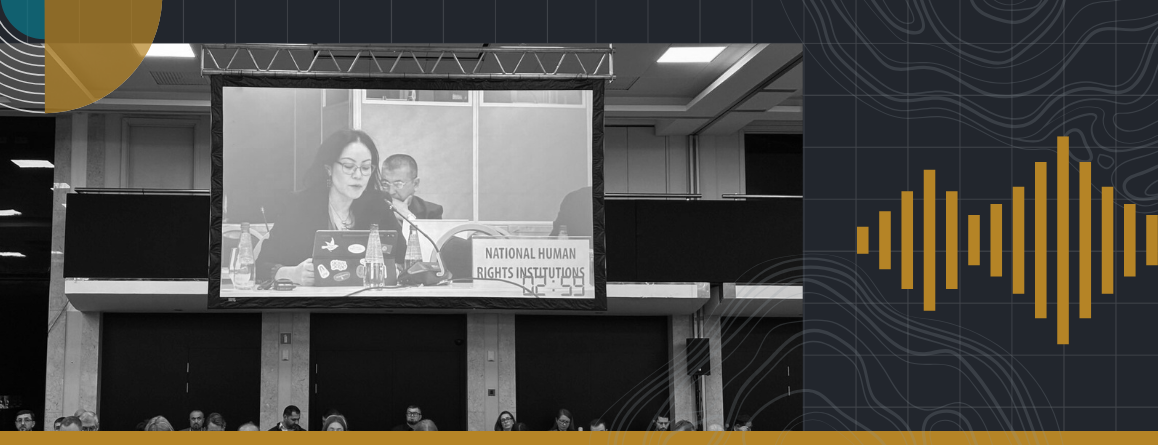On 8 October, the Chairwoman of Freedom for Eurasia delivered a statement on the situation of freedom of expression in Karakalpakstan during the 2025 OSCE ODIHR Human Dimension Conference in Warsaw. The intervention took place at the plenary session dedicated to fundamental freedoms, including freedom of expression, freedom of the media, and the safety of journalists.
The full extended statement is available below.
Distinguished delegates, colleagues, and friends,
Karakalpakstan is a sovereign republic within Uzbekistan and home to around two million people has become a stark example of the collapse of free expression. Although the Uzbekistan and Karakalpakstan’s Constitution guarantees sovereignty and even the right to secede, in practice Karakalpaks are prohibited from even talking about it. Since the 2022 protests in Nukus, when Uzbek authorities sought to strip Karakalpakstan of its right to self-determination and remove secession right from the Constitution, the region has faced relentless repression. Journalists, activists, and citizens are persecuted for peaceful expression. Independent outlets have been shut down, and anyone questioning official narratives or even dreaming about freedom is branded a “separatist” or “extremist.”
Dauletmurat Tazhimuratov, a lawyer, journalist, and human rights defender who became a central figure in advocating for Karakalpakstan’s constitutional rights. He was one of the few voices calling for peaceful dialogue and legal reform, urging authorities to respect the region’s autonomy as guaranteed under the Constitution. Yet, for these legitimate efforts, he was vilified as a “separatist.” In 2023, he was sentenced to sixteen years in prison after an unfair and politically motivated trial. The proceedings lacked transparency, and he was denied a meaningful defense. Tazhimuratov’s case has become emblematic of how Uzbekistan criminalizes peaceful expression, turning constitutional advocacy into a crime against the state.
This pattern extends beyond Uzbekistan’s borders. Karakalpak activists in exile continue to face transnational repression. A well-known Karakalpak activist Aqylbek Muratbai detained in Kazakhstan on Uzbekistan’s extradition request spent nearly a year in detention, accused of “distributing extremist materials” for sharing content from the 2023 OSCE Human Dimension Conference in Warsaw. He was also charged with “inciting mass unrest” after organizing a peaceful act of remembrance online, in which participants were asked to turn off their lights for sixteen minutes to support Dauletmurat Tajimuratov, imprisoned to 16 years. Even this symbolic gesture has become criminalized.
Inside Uzbekistan, the persecution of journalists continues relentlessly. In 2023, Mustafa Tursynbayev, founder of the popular YouTube channel Nukus Online, was arrested for his reporting on social and political issues in Karakalpakstan. He was sentenced to five years in prison on extortion charges widely condemned as fabricated. In February 2025, Tursynbayev died in custody under suspicious circumstances. Authorities claimed that he was fatally injured when a wall collapsed on him while working inside a penal colony, but human rights defenders believe his death was the result of ill-treatment and neglect. His story exemplifies the devastating human cost of speaking the truth in Uzbekistan today.
The repression that followed the 2022 events silenced almost every dissenting voice in Karakalpakstan. People live under constant surveillance, knowing that a social media “like” or a private chat message could lead to interrogation or arrest. In 2025, Rinat Utambetov was extradited from Kazakhstan and sentenced to two and a half years in prison merely for forwarding two videos of the 2022 protests and posting critical comments in a small, private Telegram group with 10 former classmates. Others have been prosecuted for simply joining online discussions with words like “Justice” or “Independent Karakalpakstan.” The aim is clear to instill fear and ensure that no one dares to speak. Apolitical expressions are also persecuted, in 2024, two Karakalpak bloggers were arrested one in Nukus and another in Tashkent for simply questioning why street signs and public inscriptions in Karakalpakstan were written in Uzbek, Russian, and English, but not in Karakalpak. These arrests, however brief, underscore how even cultural pride and linguistic identity have become grounds for punishment.
Beyond its borders, Uzbekistan continues to silence Karakalpak voices through intimidation of families, online harassment, and public disinformation. Many exiled Karakalpak activists report that relatives back home are interrogated, threatened, or fired from their jobs in retaliation for their advocacy abroad. This export of repression undermines the very essence of international human rights cooperation.
Colleagues, what makes this situation even more troubling is the persistent presence of GONGOs in international human rights spaces. Each year, at conferences like this one, they appear as the official “civil society” of Uzbekistan, painting a flattering picture of progress and reform. Yet their presence only deepens the silence around real abuses. They crowd out authentic human rights defenders, repeat state narratives, and attempt to delegitimize independent voices. This pattern should alarm us all.
Last year, during a side event on Karakalpakstan organized by our organization, Freedom for Eurasia, we witnessed this intimidation firsthand. Members of the official Uzbek delegation demanded the removal of a woman participant, falsely claiming she was unidentified. Yet all attendees had been duly verified and registered by the OSCE/ODIHR. Soon afterward, unknown individuals circulated flyers with the photo and personal details of the woman, accusing her of being that participant. Such acts of public targeting are unacceptable, they endanger civil society representatives and contradict the principles of dialogue and safety that conferences like this are meant to uphold.
Distinguished delegates, Karakalpakstan is not just a regional issue it is a test of the credibility of our shared human rights commitments. When an entire people is silenced, when their lawyers, journalists, and activists are imprisoned or exiled, and when their voices are replaced by government proxies, we cannot remain indifferent.
Uzbekistan’s official statements about democracy and reform may sound convincing in this hall, but the reality for Karakalpaks is one of fear, censorship, and persecution. It is our collective duty to ensure that their struggle for truth and dignity does not disappear into silence.
Thank you.
Watch the session — the statement begins at minute 2:37:40, available in English and Russian.
ENG https://www.youtube.com/watch?v=G5pr1Tt8G_I RUS https://www.youtube.com/watch?v=-h88Dn7wvnU
